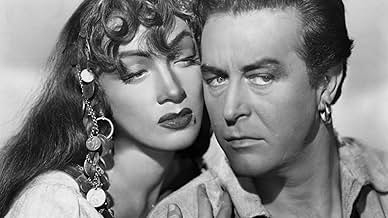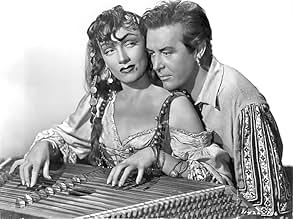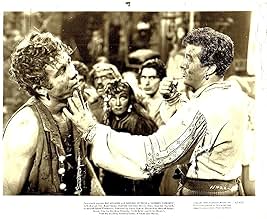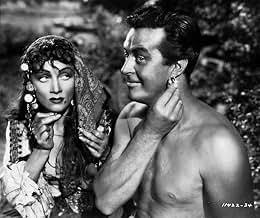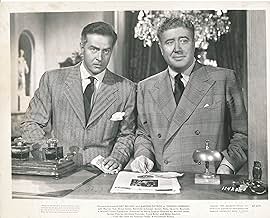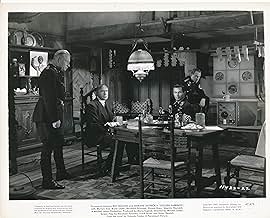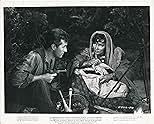VALUTAZIONE IMDb
6,6/10
1332
LA TUA VALUTAZIONE
Aggiungi una trama nella tua linguaOn the eve of WW2, a British spy goes to Germany to obtain a secret poison-gas formula from a scientist but things go awry and he is saved by a beautiful nomadic gypsy woman.On the eve of WW2, a British spy goes to Germany to obtain a secret poison-gas formula from a scientist but things go awry and he is saved by a beautiful nomadic gypsy woman.On the eve of WW2, a British spy goes to Germany to obtain a secret poison-gas formula from a scientist but things go awry and he is saved by a beautiful nomadic gypsy woman.
- Regia
- Sceneggiatura
- Star
Harry Anderson
- German Farmer
- (non citato nei titoli originali)
Gordon Arnold
- Gypsy Boy
- (non citato nei titoli originali)
Ellen Baer
- Gypsy Girl
- (non citato nei titoli originali)
Martha Bamattre
- Wise Old Woman at the Krosigk's
- (non citato nei titoli originali)
Charles Bates
- Gypsy Boy with Information
- (non citato nei titoli originali)
Carmen Beretta
- Tourist
- (non citato nei titoli originali)
Louise Colombet
- Flower Woman
- (non citato nei titoli originali)
Robert Cory
- Burlington Club Doorman
- (non citato nei titoli originali)
Gwen Davies
- Stewardess
- (non citato nei titoli originali)
Recensioni in evidenza
Marlene Dietrich plays an European Gypsy woman in Pre-World War II Europe. Ray Milland played the British officer Denistoun who is on a mission. Ray Milland and Marlene Dietrich are excellent, entertaining, and enjoyable in the film. The story is fine and could have used more work but the Milland's British gentleman turned Gypsy in order to escape the Nazis does a fantastic job. It's interesting to see a character like Denistoun to transform into a Gypsy. The ending is worth watching the film. The film doesn't address the Nazi war crimes. European Gypsies were also targeted and persecuted by the Nazis during World War II. Still, this film is entertaining to watch and suspenseful. The cast is first rate in the Hollywood studio system factory where films were made faster even with mediocre scripts. Still, this film is one of my favorites with Marlene Dietrich.
Mitchell Leisen loved the long flashbacks :"hold back the dawn" was a story the hero told the director himself;" to each his own" began with a shot of a middle age lady whose misfortunes were told ;" no man of her own" ,faithful to the novel ,began with a "give up the fight" feeling .He had also tackled the fantasy genre in "death takes a holiday".
"Golden earrings" is a long flashback,blending spy thriller scenes in a just-before-WW2 Germany with snatches of supernatural thrown in :the heroine knew his beloved one would come (she's a fortune teller anyway) and ,most amazing scene,the hero himself through her contact becomes a clairvoyant,seeing his mate's future in the palm of his hand.
I do not put,however ,"golden earrings " in the same league as the movies I mention above;I do not think it's underrated cause its flaws are glaring:first of all,like the Jews,the gypsies were persecuted and sent to concentration camps by the Nazis before and during the war ;so it is absolutely impossible to believe they are allowed -although one of the officers says they are an inferior race-to enter the scientist's desirable mansion to tell fortunes.Besides,everybody speaks English in Germany ,only some soldiers mumble a few German sentences and that's it.
I do like Ray Milland -a certainly underrated actor ,sadly remembered by too many people as the villain in "love story" ,his worst role- and Marlene Dietrich is arguably a fascinating actress ,but as Mardi Gras gypsies ,they cannot be taken seriously .
"Golden earrings" is a long flashback,blending spy thriller scenes in a just-before-WW2 Germany with snatches of supernatural thrown in :the heroine knew his beloved one would come (she's a fortune teller anyway) and ,most amazing scene,the hero himself through her contact becomes a clairvoyant,seeing his mate's future in the palm of his hand.
I do not put,however ,"golden earrings " in the same league as the movies I mention above;I do not think it's underrated cause its flaws are glaring:first of all,like the Jews,the gypsies were persecuted and sent to concentration camps by the Nazis before and during the war ;so it is absolutely impossible to believe they are allowed -although one of the officers says they are an inferior race-to enter the scientist's desirable mansion to tell fortunes.Besides,everybody speaks English in Germany ,only some soldiers mumble a few German sentences and that's it.
I do like Ray Milland -a certainly underrated actor ,sadly remembered by too many people as the villain in "love story" ,his worst role- and Marlene Dietrich is arguably a fascinating actress ,but as Mardi Gras gypsies ,they cannot be taken seriously .
Those reviewers who have complained that this movie lacks plausibility or has problems of construction are missing the point. This is a wonderfully camp romance, with plenty of Play, gypsies! Dance, gypsies! music, that both sends up exotic love stories and celebrates them. Buttoned-up Ray Milland makes an amusing foil for a Dietrich with black hair, tattered scarves, and tons of jewelry. The character's eagerness to feed Milland and look after him more closely resembles the good German hausfrau Dietrich was off the set than her mannered vamp roles. Censorship being in force, it's made clear that they share a caravan on platonic terms only, with Milland fighting off Dietrich's advances with a determination remarkable for a heterosexual bachelor who might be killed any day. His only excuse is that she smells, so perhaps a stuffy, fastidious Englishman might indeed be put off.
In the small role of Milland's young companion on his secret mission, Bruce Lester adds a note of camp of a different kind. We are told at the beginning that he hero-worships Milland, and indeed he rather fawns on him. When, after they are separated, he meets Milland, now transformed into a brown-skinned gypsy with a shirt open to the waist, his glowing appreciation of the disguise even further suggests that not only Dietrich is romantically infatuated with Milland.
Despite the wonderfully improbable characters and sequence of events, the growing love of Milland for Dietrich and his acceptance of the non-rational aspects of life is rather touching. And when, on their last night alone before he escapes, he says that each of them now contain half of the other, the two have become one, and then darkness falls, I think we can assume that the censor decided to give them a break! One goof--at the beginning, Milland, who is supposed to be English, refers to a lieutenant, using the American pronunciation. (The English say "leftenant.") Since Milland was British, he must have been saying it that way because the American movie-makers feared that American audiences would be distracted and confused by the British style.
In the small role of Milland's young companion on his secret mission, Bruce Lester adds a note of camp of a different kind. We are told at the beginning that he hero-worships Milland, and indeed he rather fawns on him. When, after they are separated, he meets Milland, now transformed into a brown-skinned gypsy with a shirt open to the waist, his glowing appreciation of the disguise even further suggests that not only Dietrich is romantically infatuated with Milland.
Despite the wonderfully improbable characters and sequence of events, the growing love of Milland for Dietrich and his acceptance of the non-rational aspects of life is rather touching. And when, on their last night alone before he escapes, he says that each of them now contain half of the other, the two have become one, and then darkness falls, I think we can assume that the censor decided to give them a break! One goof--at the beginning, Milland, who is supposed to be English, refers to a lieutenant, using the American pronunciation. (The English say "leftenant.") Since Milland was British, he must have been saying it that way because the American movie-makers feared that American audiences would be distracted and confused by the British style.
This film is exceptional in that Marlene & Raymond present outstanding performances. The acting in this film is the greatest strength of the production, but the script, direction, and editing deserve applause. There is an extraordinary chemistry that exsists between the two stars. If you like Marlene, and you like Raymond, you'll love this film..... (It's a classic that compares with Casablanca.)
I've watched this film perhaps a dozen times, and yet it always stays fresh with me. I think it's one of the best things Dietrich has ever done. This is a Dietrich you've never seen before. Not a worldly femme fatale, but an earthy, highly engaging woman. The interplay between this uncultured gypsy (Dietrich) guided by the spirit world and the stuffy, establishment rationalist(Milland) is both funny and poignant. Dietrich and Milland are simply wonderful in their roles, and Leisen's direction is subtle and clever. If the story lacks plausibility, who cares? This picture belongs to Dietrich and Milland and the wonderful authenticity they bring to their characters.
Lo sapevi?
- QuizIn the scene with Lydia and the stew pot, dry ice was used to give the impression of vapors and heat. However, a small fire was lit under it, and when filming resumed, between takes Marlene Dietrich assumed there was no real heat and suffered second-degree burns to her hand. She refused to hold up production and instead kept dipping her hand in the pot that had been refilled with ice water.
- BlooperIn the climax where Lydia is escaping though the wilderness from the Nazis, in some shots she is seen wearing high heels and at other times appears in bare feet.
- ConnessioniFeatured in Hollywood Mavericks (1990)
- Colonne sonoreGolden Earrings
Music by Victor Young
Lyrics by Jay Livingston and Ray Evans
Sung by Murvyn Vye (uncredited)
I più visti
Accedi per valutare e creare un elenco di titoli salvati per ottenere consigli personalizzati
- How long is Golden Earrings?Powered by Alexa
Dettagli
Botteghino
- Budget
- 1.000.000 USD (previsto)
- Tempo di esecuzione1 ora 35 minuti
- Colore
- Proporzioni
- 1.37 : 1
Contribuisci a questa pagina
Suggerisci una modifica o aggiungi i contenuti mancanti

Divario superiore
By what name was Amore di zingara (1947) officially released in India in English?
Rispondi
